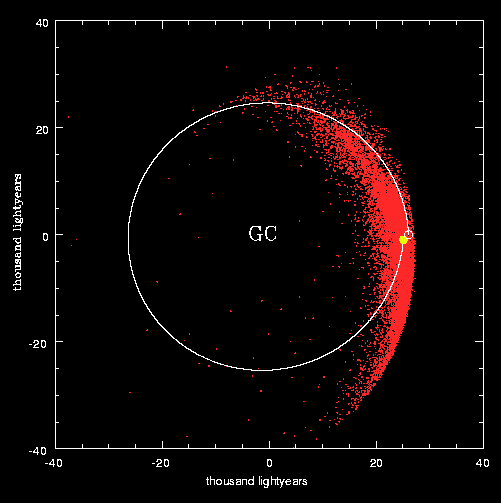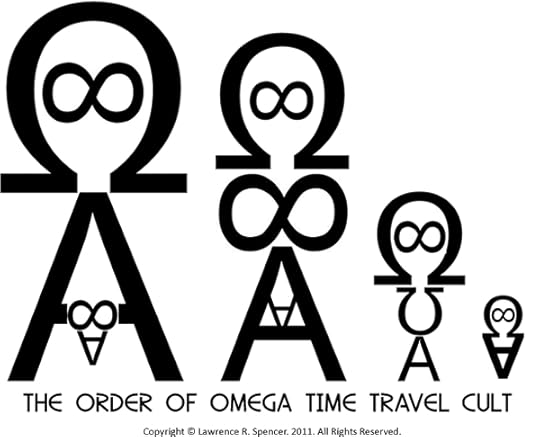Lawrence R. Spencer's Blog, page 165
May 22, 2021
EARTH: INMATE UNIFORM
Republished by Blog Post Promoter
“Biological bodies are specifically designed and designated as the lowest order of entity in the “Old Empire” caste system. When an IS-BE (Immortal Spiritual BEing) is sent to Earth, and then tricked or coerced into operating in a biological body, they are actually in a prison, inside a prison.”
~ Airl, from the book Alien Interview ~
AN ILLUSION
May 21, 2021
SHE CREATES HER OWN REALITY
Republished by Blog Post Promoter
“I am willing to accept that she creates her own reality except for some of the parts where she can’t help but wonder what the hell she was thinking.” — Almost New Age – by Brian AndreasRECYCLING
Republished by Blog Post Promoter
DON’T FORGET TO RECYCLE YOUR GARBAGE WHEN YOU LEAVE

May 20, 2021
WE CREATE THE ENERGY WE PERCEIVE
Republished by Blog Post Promoter
 When I focus too much attention on human activities I become more and more crazy, hateful, depressed and hopeless about the “condition of the world”. It seems as though most of the agony, despair, chaos and destruction in this world is created by people! However, I also realize that it is not correct to make a general statement about “everyone” or all people. The source of misery and chaos is just a TINY NUMBER of psychopathic beings. I think it is less than 5%. It is their psychosis that drives them them to CONTROL and DESTROY everything and everyone. They are only able to destroy. They are incapable of creation.Beings who create Life create beauty, love, kindness, empathy, pleasure, patience, prosperity, abundance for themselves and everyone else. They create a very high wave frequency of energy…the wave frequency that can only be experienced as aesthetics – music, painting, dancing. Or, experienced as “love”, reverence, awe, perfect harmony, profound understandings, empathy, or through Acts of Creation usually attributed to “gods”.I am realizing more and more recently that people actually GIVE POWER to psychopaths by putting attention on them, or by allowing them to continue creating harm. Having a biological body makes people dependent on the need for physical energy, food, housing, clothing, heat, etc.. So, the psychopaths always take control of the “sources of energy” by creating “money”. They also create “fear of death”. When humans sink so low spiritually they forget they are SPIRITS and and they don’t need a body…so they are afraid of death because they think that “when the body is dead, I am also dead”.This is the most fundamental lie and trap used by all psychopaths, including priests and bankers.I know that you understand these things. But, I always try to remind myself that I am “spirit”…. and that spirits create the energy we perceive and share with other spirits. The “realm of spirits” is apparently infinite and is limited only by our ability to create and perceive.~ Lawrence R. Spencer (2019)
When I focus too much attention on human activities I become more and more crazy, hateful, depressed and hopeless about the “condition of the world”. It seems as though most of the agony, despair, chaos and destruction in this world is created by people! However, I also realize that it is not correct to make a general statement about “everyone” or all people. The source of misery and chaos is just a TINY NUMBER of psychopathic beings. I think it is less than 5%. It is their psychosis that drives them them to CONTROL and DESTROY everything and everyone. They are only able to destroy. They are incapable of creation.Beings who create Life create beauty, love, kindness, empathy, pleasure, patience, prosperity, abundance for themselves and everyone else. They create a very high wave frequency of energy…the wave frequency that can only be experienced as aesthetics – music, painting, dancing. Or, experienced as “love”, reverence, awe, perfect harmony, profound understandings, empathy, or through Acts of Creation usually attributed to “gods”.I am realizing more and more recently that people actually GIVE POWER to psychopaths by putting attention on them, or by allowing them to continue creating harm. Having a biological body makes people dependent on the need for physical energy, food, housing, clothing, heat, etc.. So, the psychopaths always take control of the “sources of energy” by creating “money”. They also create “fear of death”. When humans sink so low spiritually they forget they are SPIRITS and and they don’t need a body…so they are afraid of death because they think that “when the body is dead, I am also dead”.This is the most fundamental lie and trap used by all psychopaths, including priests and bankers.I know that you understand these things. But, I always try to remind myself that I am “spirit”…. and that spirits create the energy we perceive and share with other spirits. The “realm of spirits” is apparently infinite and is limited only by our ability to create and perceive.~ Lawrence R. Spencer (2019)
May 19, 2021
BE WILDE
Republished by Blog Post Promoter
“The truth is rarely pure and never simple.”
― Oscar Wilde, The Importance of Being Earnest
“Yes: I am a dreamer. For a dreamer is one who can only find his way by moonlight, and his punishment is that he sees the dawn before the rest of the world.”
― Oscar Wilde, The Critic as Artist
“Never love anyone who treats you like you’re ordinary.”
― Oscar Wilde
“Who, being loved, is poor?”
― Oscar Wilde
“I don’t want to be at the mercy of my emotions. I want to use them, to enjoy them, and to dominate them.”
― Oscar Wilde, The Picture of Dorian Gray
“Whenever people agree with me I always feel I must be wrong.”
― Oscar Wilde
————————————————————–
Oscar Fingal O’Flahertie Wills Wilde (16 October 1854 – 30 November 1900) was an Irish writer and poet. After writing in different forms throughout the 1880s, he became one of London’s most popular playwrights in the early 1890s. Today he is remembered for his epigrams, his only novel (The Picture of Dorian Gray), as well as his plays.
HAPPY YEAR(s)
Republished by Blog Post Promoter
Time is relative to the point of view of the observer. Regardless of your respective definition of a “year”, you are traveling through time in the physical universe, as measured by one or more monitoring systems devised by man to track the motion of particles through space. Here is a short list of definitions of the word “year”.
(Visualization of the orbit of the Sun (yellow dot and white curve) around the Galactic Centre (GC) in the last GALACTIC YEAR. The red dots correspond to the positions of the stars)
The galactic year, also known as a cosmic year, is the duration of time required for the Solar System to orbit once around the center of the Milky Way Galaxy.[1] Estimates of the length of one orbit range from 225 to 250 million “terrestrial” years. Solar System is traveling at an average speed of 828,000 km/h (230 km/s) or 514,000 mph (143 mi/s),which is about one 1300th of the speed of light. If you could travel at that speed in a jet aircraft along the equator, you would go all the way around the world in approximately 2 minutes and 54 seconds. Even at this speed, it still takes the solar system 230 million years to orbit the center of the Milky Way Galaxy one time. Hang on and enjoy the ride!
For those who prefer shorter periods of time, here are a list of the Wikipedia definitions of other “years”
2 Seasonal year3 Calendar year3.1 Numbering calendar years4 Other annual periods4.1 Fiscal year4.2 Academic year5 Astronomical years5.1 Julian year5.2 Sidereal, tropical, and anomalistic years5.3 Draconic year5.4 Full moon cycle5.5 Lunar year5.6 Vague year5.7 Heliacal year5.8 Sothic year5.9 Gaussian year5.10 Besselian year5.11 Variation in the length of the year and the day5.11.1 Numerical value of year variation5.12 Summary6 Symbol6.1 Symbol a6.1.1 SI prefix multipliers6.2 Symbols y and yr7 “Great years”7.1 Equinoctial cycle7.2 Galactic yearThis message has been transported to you as a public service by the Order of Omega Time Travel Cult family!
THE PEOPLE
Republished by Blog Post Promoter
Plato made the following statement 2,395 years ago. It seems that “the people” never change: “The people have always some champion whom they set over them and nurse into greatness. …this and no other is the root from which a tyrant springs; when he first appears he is a protector. When the tyrant has disposed of foreign enemies by conquest or treaty, and there is nothing to fear from them, then he is always stirring up some war or other in order that the people may require a leader”.
“The people have always some champion whom they set over them and nurse into greatness. …this and no other is the root from which a tyrant springs; when he first appears he is a protector. When the tyrant has disposed of foreign enemies by conquest or treaty, and there is nothing to fear from them, then he is always stirring up some war or other in order that the people may require a leader”.“Plato Greek: (423 – 348 BCE) was a philosopher, as well as mathematician, in Classical Greece. He is considered an essential figure in the development of philosophy, especially the Western tradition, and he founded the Academy in Athens, the first institution of higher learning in the Western world. Along with his teacher Socrates and his most famous student, Aristotle, Plato laid the foundations of Western philosophy and science.
Plato’s dialogues have been used to teach a range of subjects, including philosophy, logic, ethics, rhetoric, religion and mathematics. His lasting themes include Platonic love, the theory of forms, the five regimes, and innate knowledge, among others. His theory of forms launched a unique perspective on abstract objects, and led to a school of thought called Platonism.”
READ PLATO’S MOST INFLUENTIAL THOUGHT IN “THE REPUBLIC”https://www.gutenberg.org/files/1497/1497-h/1497-h.htm












